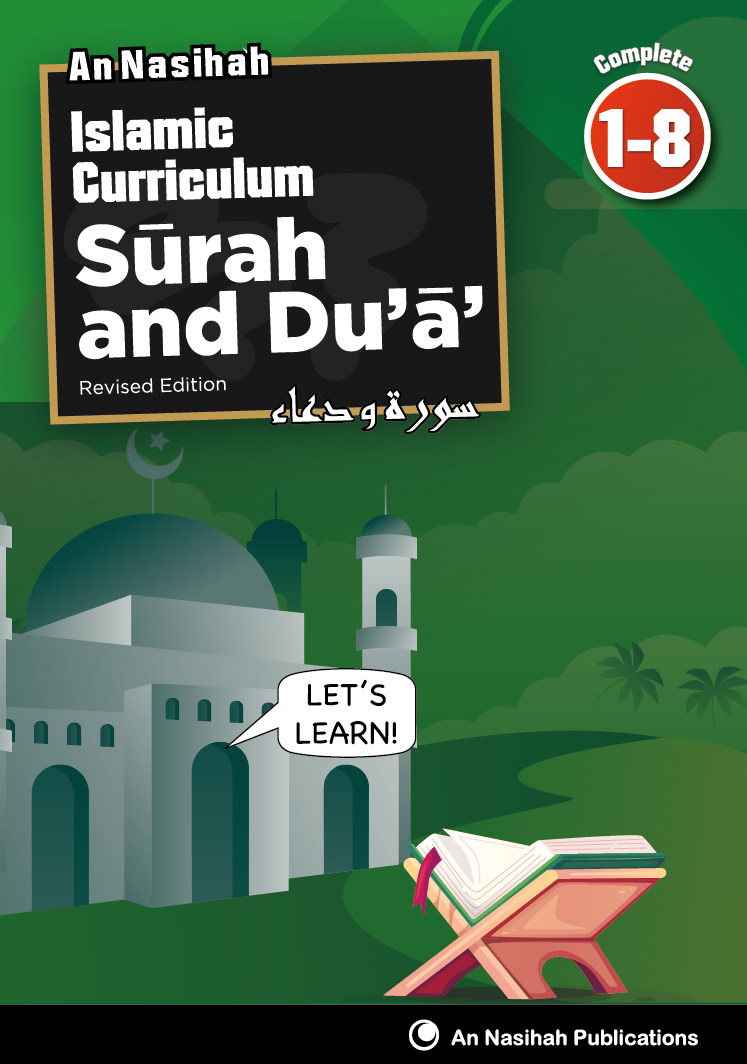Maktab Syllabus

Tajweed
In Tajweed classes, students are taught the rules governing the proper pronunciation of the Quran when reciting it. This includes learning the correct pronunciation of Arabic letters, proper articulation of sounds, and applying rules for pausing, elongation, and other aspects of Quranic recitation. The aim is to ensure that the Quran is recited with accuracy, beauty, and reverence.
Surah and Dua
All the Surahs and Duas that a child will need, compiled in one complete book, fully referenced from authentic sources. Complete with revision trackers and 99 names of Allah. Some specification of the Surah and Dua book are given as below
✅ 29 Surahs, 130 Duas & 99 Names of Allah
✅ Translation and Transliteration for early years
✅ Level-based development
✅ Trackers for each section
✅ End of Level certificates

Fiqh
Worshiping Allah is the central part of our faith. It’s not just about praying, but also about living in a manner that displays our respect and love for Allah. This involves adhering to the fundamental principles of Islam – having faith in Allah, praying regularly, helping those in need, fasting during Ramadan, and making a pilgrimage to Mecca if possible. It’s also important to ensure that we are abiding by all of Allah’s directives appropriately. This requires a clear understanding of Islamic teachings and striving to live by these teachings daily. Even though it may be challenging, adhering to these rules brings peace and happiness into our lives, along with the promise of rewards in the afterlife. Therefore, in order to worship Allah Ta’ala, practice the pillars of Islam, and fulfill all His commands accurately, it’s necessary for us to learn Fiqh, the understanding of Islamic law.
Ahadith
To learn the blessed words of Rasulullah ﷺ and practice upon it, is an honorable undertaking that we, as a community, should strive for. The teachings of Prophet Muhammad ﷺ serve as a guiding beacon in our lives, offering solutions to our challenges, inspiring righteousness, and encouraging personal and spiritual growth. Each word uttered by the Prophet ﷺ is filled with profound wisdom and deep significance, reflecting his immense compassion and commitment to humanity.
As followers, it is our duty to comprehend, internalize, and implement these teachings in our everyday lives. By doing so, we not only honor the Prophet’s teachings but also reinforce our connection with our faith. Additionally, practicing these teachings sets a valuable example for the younger generation, nurturing their engagement with our rich religious heritage. Let us collectively embark on this enlightening journey, fostering a stronger, compassionate, and spiritually enriched community
Sirah
Embracing the exemplary lifestyle of Rasulullah ﷺ is a commendable journey. His life, marked by compassion, humility, and devotion to Allah, is a blueprint for righteous living. He imparted priceless lessons in morality, ethics, and spirituality. By studying his Seerah (biography), we can comprehend and incorporate these teachings into our daily lives. This not only deepens our bond with Allah but also fosters personal growth. Therefore, studying the Seerah is crucial to truly follow the admirable lifestyle of Rasulullah ﷺ, bringing us closer to the ideal Islamic way of life.
Tarikh
Studying Tarikh, or history, is vital for learning lessons from past civilizations. History provides a wealth of knowledge about how previous societies functioned, the mistakes they made, and their accomplishments. These insights can guide us in our current lives, helping us avoid repeating past errors and emulating successful strategies. From a religious perspective, studying the history of previous nations can deepen our understanding of prophetic stories and moral lessons in holy texts. Therefore, studying Tarikh is not just about learning the past; it’s about illuminating our present and shaping a better future.
Aqaid
Studying Aqa’id, or Islamic beliefs, is crucial to ensuring the correctness and strength of our Imaan (faith). Aqa’id provides a clear understanding of fundamental Islamic tenets, such as belief in Allah, His prophets, angels, divine scriptures, predestination, and life after death. A thorough grasp of these principles helps us maintain a strong and accurate faith. Moreover, it allows us to navigate any misconceptions or doubts that may arise in our spiritual journey. Therefore, studying Aqa’id is not just a pursuit of knowledge; it’s an essential practice to fortify our faith and align our beliefs with the teachings of Islam.
Akhlaq
A dedicated subject on Akhlaq is included in the curriculum to develop the lofty character shown by Rasulullah ﷺ,” which is designed to instill the noble qualities exemplified by the Prophet Muhammad ﷺ. Through an in-depth study of his life and teachings, participants will learn to cultivate virtues such as compassion, honesty, humility, and patience. The curriculum combines theoretical knowledge with practical applications, including self-reflection exercises, community service projects, and strategies for personal improvement. By integrating these principles into daily life, students will not only enhance their moral and ethical conduct but also foster a deeper spiritual connection with Allah, ultimately striving to embody the exemplary character of Rasulullah ﷺ.
Adab
The content on Adab aimed at developing the lofty character shown by Rasulullah ﷺ. Participants will practice all actions as shown by Rasulullah ﷺ, focusing on respect, kindness, humility, and patience. Through interactive lessons, role-playing scenarios, and reflective activities, students will enhance their interpersonal relationships and moral standards, striving to mirror the noble character of Rasulullah ﷺ.
©2024 MESHK. All Rights Reserved.
